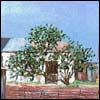Why do bad things happen?
Why are good people punished?
How can a G‑d that is good allow all this to go on for so long?
These are the questions we ask constantly at yeshiva. Indeed, everyone seems to ask them all the time, if they're not too busy avoiding the questions.
To be honest, I've never really had a problem with these questions, for some reason. For most of my life, I figured we lived in a random world where bad and good were hard to define, where everything was gray. And when I started to believe in Judaism, I intellectually accepted all the arguments that came my way. After all, they made sense.
Until three days ago.
Until the world seemed to flip upside down.
Until someone decided to plow his car into a group of people who were trying to lead normal lives in the least normal city in the world.
I remember reading about it as I was about to go to bed on the Jerusalem Post website. It had only happened half an hour ago, I could still get some good interviews.
As I walked hastily towards the center of Jerusalem, I didn't really think about what I was doing, having no credentials and jumping straight into my first time reporting a terror attack. My first time at a terror attack scene.
As I arrived, I was surprised to come upon a sea of Israelis watching the scene. There didn't seem to be a consensus on how to feel. Everyone seemed more shocked, and more determined to see the scene, than anything else. But there was an energy, an angry, confused energy that was clearly stirring everyone.
The next hour was a mess of confusion, a mess of people trying to find answers, being arrested, trying to get close, to get answers, while the soldiers screamed at them, threatened them, to move back, to behave, to stay in control.
It was a window into a world I had never experienced before, a world of real danger lurking at every moment, of real enemies that lurked in the shadows and waited to pounce without warning, a world where one day can be normal and the next can be chaos.
I even was given access into the world on the other end. Some young guys, blinded by their anger, thought that I was an Arab. They looked at me with a hatred I had never seen before. They threatened me, sneered at me, and said sarcastic comments to me.
Was it worth explaining to them who I was? Probably not.
I think it was about this time the world really stopped making sense to me. It was the first hint I had that things were backward, that things didn't make as much sense as I thought they did.
Defining the world by my classes at yeshiva no longer worked. Explaining that G‑d is beyond understanding was no longer enough. Nothing made sense.
As if to distract me from these thoughts, the police took down the barriers to the scene right at that moment. The crowd swarmed. First, everyone watched in complete silence as the car was taken away. For a moment, everything seemed to stop, as the photographers all stood there snapping away at the smashed up creator of mayhem, the weapon used to injure seventeen people and remind Jews everywhere that they would never be totally safe.
Suddenly, a soldier screamed for the car to be taken away already and time suddenly sped up. People ran towards where the car hit a building, trying to see what was left of the wreckage, trying to gain some semblance of an idea of what was going on.
In a matter of no time, the roads were cleaned, the crowd started to thin, and the journalists descended.
The world looked a bit more normal. But I couldn't shake the upside down feeling in my stomach, that things were out control and backwards. I looked for someone to help me.
The first person I interviewed was Yerach Tucker, the spokesman for the First Responder Organization of Israel. I'll be honest. He really didn't help me feel better.
He talked about his experience rushing to the scene, how no one was killed.
And then I asked him how this affected the psyche of Jerusalem. Yerach talked about how Jerusalem was used to these attacks at this point, that as more attacks occurred, they were able to adapt and respond faster, but this, in a way, only made things worse. "It's terrible. It's in the middle of Jerusalem again and again and again."
Seemingly out of nowhere, though, he switched his tone. He said, "It was a big miracle." He said this with a smile. Was he kidding? A miracle? He just talked about how horrible this was!
But he kept repeating it. "It was a big big miracle." People could have been killed, since it happened, "a minute from the Kotel, a minute from the center of Jerusalem."
Whatever.
I moved on to person #2. Gavriel Frievsom. Nineteen. A Zaka Volunteer (Zaka is a humanitarian organization, responding to tragic incidents in Israel). He looked like someone I might have hung out with outside of class. Like a young, nice guy. But he talked like an adult, older than he should have been.
Stiffly, almost without emotion, Gavriel described what had happened. Everything came out in one big sentence, one big rush, as if he was just trying to get it all out,
"10:55 I was walking towards the Old City, I heard gun shots, I turned around, there's a whole brigade of artillery soldiers, they were just touring around the Old City, they were crossing the street... At the same time while they were crossing the street there was this car swerving hitting anything it could see, anything that was moving... At the same time, senior officers from the artillery brigade then shot at that car, killing the terrorist. He then slammed into the wall; within moments, rescue services arrived."
And then he was gone.
Exhausted and close to giving up, I went over and recorded the last person I could find, a man named Eitan Ochaion who was being interviewed by an Israeli news crew. I could hardly understood the Hebrew he was speaking, but I figured I might as well get one last interview and translate it later.
Eitan seemed like the archetypal Israeli Tough Guy. Buff and tanned, he was clearly a normal part of the Israeli scene, a Jew just living his life.
But then he began speaking. Suddenly, all the usual toughness I had seen in Israelis seemed to melt away. He spoke as if on the verge of tears the entire time. His huge shoulders were hunched, his eyes cast down, his voice broke randomly. He was no longer just a normal guy. He was a Jew. He was a human.
Watching Eitan speak, despite not knowing what he was saying, broke my heart. All the feelings I had, all the emotions that I was holding back, they just seemed to come together as I watched him share his story. The contradictions, the horrible, sad situation of seventeen innocent soldiers being injured for no reason, everything, it all came together.
Right after the interview, I put my recorder in my pocket and walked back home.
For days afterwards, I could not help feeling slightly disconnected, as if being at this scene had suddenly placed me in a world of randomness, where G‑d was distant and far, and understanding was an illusion. Where people that didn't deserve to get hurt, to get punished, were hurt and punished daily. Where life was unfair.
Suddenly, yeshiva wasn't so much fun anymore. It seemed like fantasy camp. I might as well have been reading Lord of the Rings rather than the Chumash.
The world was good? G‑d cared about us? Everything happened for a reason? Yeah, right. Seventeen people were hurt for no reason, Jews were angry and defenseless and alone, and G‑d no longer seemed to care.
Sigh.
I tried, I really did, to look at the bright side. To see that it was a miracle. To delve into chassidic teachings, to love the world around me. But nothing seemed to work.
A few days after the attack, I received an email with Eitan Ochaion's translated interview. I was scared. Did I really want to confuse myself any more? Would this help me or just make the balagan (mess) even bigger?
With little choice, I started reading the interview. What he said... it was quite incredible.
Eitan described being near the attack when it occurred, he described hearing about it and "immediately [doing] a 180."
An IDF sergeant came up to him the moment he arrived and said, "I killed him, he is killed inside the vehicle."
And then: "I approached the vehicle, I noticed a woman trapped between the bumper of the vehicle and the wall, hanging between heaven and earth; the bumper of the vehicle was at her stomach area and down. I entered the vehicle. The terrorist that was killed was still in there. I got the vehicle out of shift. I asked for help from a few people that were at the location. We pushed the car back, I managed to release the injured lady, I performed first aid on her. An emergency ambulance arrived immediately, I entered the emergency ambulance and evacuated her to Ein Karem."
I imagined Eitan saying all this, his hunched shoulders, his tears held back, and suddenly, while the picture remained the same, the essence seemed to change radically. Suddenly, his apparent weakness turned to incredible strength in my mind's eye. His body matched his soul. He probably saved that woman's life, had done everything he could to help, and had exhausted his emotional and physical strength in the process.
I wish I had written down Eitan's number so I could call him up and thank him. And thank Gavriel. And thank Yerach. Thank Eitan for helping that woman, thank them for helping me, thank them for helping the world.
I don't think I'll ever truly understand why the world is so upside down, why it's so backwards and twisted around. I don't think I'll ever completely make order of the balagan.
But if the night of September 22nd taught me anything, it was that as long as there are people like Yerach, Gavriel, and Eitan around, I'll always have faith. As long as there are people that care enough about the world to try to bring the sparks out, to show the world how beautiful it can be, even when it's at its darkest, I'll always believe that G‑d is a part of this world.
I remember asking Yerach if he thought Jews would change their habits in Jerusalem, be more hesitant to go out. Amazingly, in such a scene, he gave me a true genuine smile and said:
"I don't think so, it's been happening for two thousand years, from the Inquisition until now. We live it, people trying to stop us from living and going to our holy places and to pray. No one is going to stop us."
The world goes on. The Jews go on. Thank G‑d.





